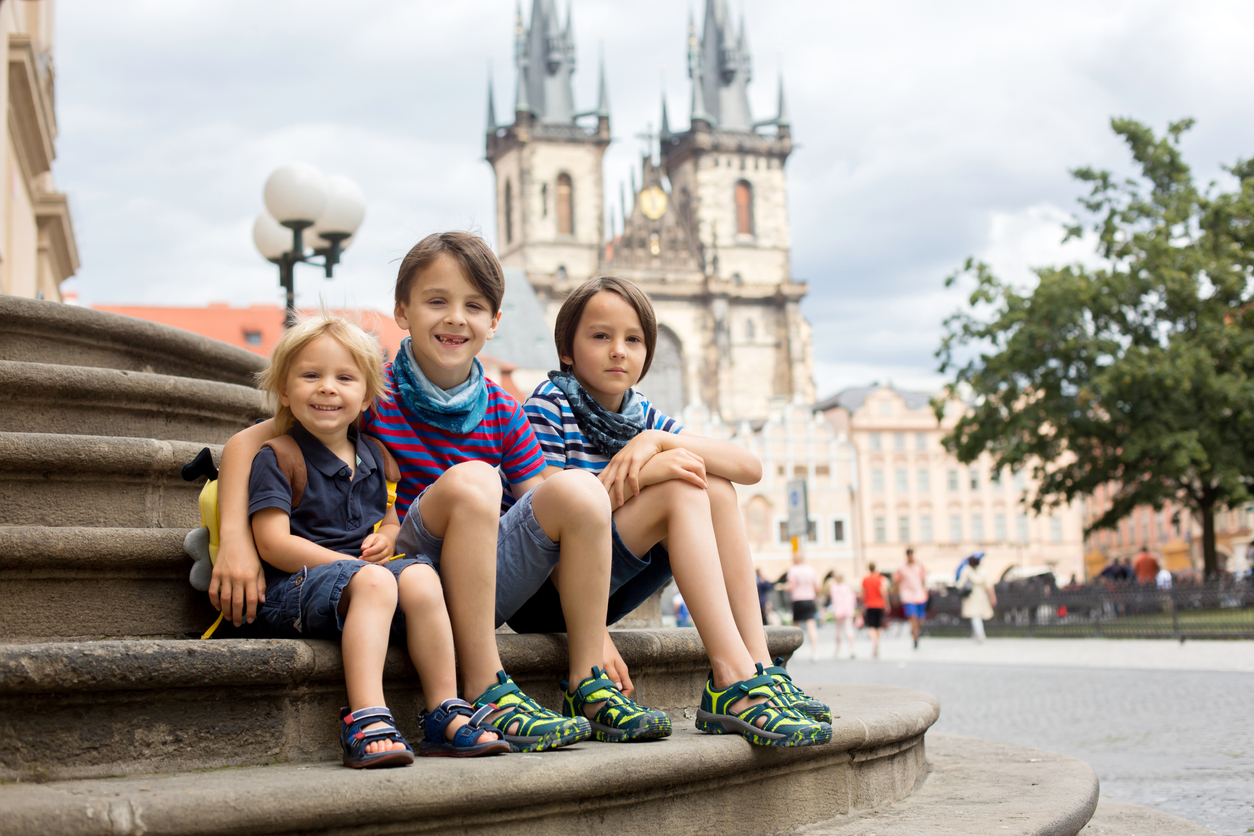78 Boy Names of Slavic Origin and their Meaning


Reviewed and approved by the pediatrician Marcela Alejandra Caffulli
Central Europe, the Balkan area, part of Eastern Europe, and Northern Asia are just some of the central areas where Slavic languages are spoken. They belong to the Indo-European family and include languages such as Russian, Serbian, Croatian, Bulgarian, Czech, and Ukrainian, among others. That being said, if you’re looking for a name that reflects this same essence for your little one on the way, you can’t miss the following list. Below, we’ll share with you the best boy names of Slavic origin and their meaning.
Selected list with the best boy names of Slavic origin
According to a study developed by the Complutense University of Madrid, the Slavic languages come from the ancient ecclesiastical Slavic. This was used and protected under the umbrella of the Orthodox Church.
If you have a special and unique relationship or kinship with these territories, we invite you to choose one of these names for your future baby.
Discover: 25 Girl Names of Ukrainian Origin
Boy names of Slavic origin, from A to C
- Andrik: A variant of the name Andrew and alludes to the one who is “manly.”
- Bogdan: Means “gift from God.”
- Bogdanovich: Alludes to that which has been “given by God.”
- Bogoslav: For “one who receives glory from God.”
- Bojan: Means “battle.”
- Bladimir: Variant of Vladimir.
- Bogo: Derived from the name Bogoslav. Therefore, it also means “he who receives the glory of God.”
- Boleslao: Alludes to “the most glorious.”
- Bogomil: Means “friend of God.”
- Branco: Alludes to “glory.”
- Blaz: Comes from the name Blaise, which in turn derives from blaesus. In this regard, it means “stammering or stuttering.”
- Boris: Means “God’s own.”
- Brahim: This name comes from Abraham. Therefore, it also refers to the “father of all.”
- Cachi: Is one of the variants of Casimiro, which means “declaration of peace.”
- Casimiro: Refers to “one who preaches peace.”

Slavic boy names, from D to G
- Damir: Refers to “one who gives peace.”
- Danya: Means “gift from God.”
- Davis: Alludes to “son of David.”
- Davor: Although it’s a name that comes from this area, its meaning isn’t yet clear.
- Dimitri: Is one of the forms of Demetrius. Therefore, it also alludes to the one who is a “lover of the earth.”
- Daska: Means “ribbon, rod.”
- Dimka: Alludes to one who is “universal.”
- Dobry: Refers to a little one who will be “good.”
- Dragan: Means “dear.”
- Drazen: Is a name of Croatian origin that derives from the word dorgu. It means “precious.”
- Gheorghievich: It’s thought to date back to George. However, the truth is that it may belong to different ancient names.
- Gniew: Alludes to “anger.”
- Gniewko: In line with the previous option, it’s a derivative of Gniew and, therefore, carries the same meaning.
- Goran: alludes to a “man of the mountains.”
Boy names of Slavic origin, from H to L
- Igorevich: This name is believed to come from the Scandinavian proper name Íngvar. Therefore, it alludes to “young warrior.”
- Il’ich: This is the patronymic surname from the biblical name Elijah.
- Ivan: This is the Russian form of John. Therefore, it means that “God is good, merciful.”
- Ivanova: This surname is of Slavic origin, but also serves as a proper name.
- Jaris: Is one of the forms of Juri, which means “farmer.”
- Jaroslaw: Is one of the variants of Jaroslav. In this regard, it alludes to the ‘”beauty of spring.”
- Krunoslav: Means “crown of glory” and is a name of Croatian origin.
- Ladislao: Refers to “one who rules with glory.”
- Laszlo: Also for the one who “rules with glory.”
- Lasota: Refers to a “forest man.”
- Lech: Alludes to “cunning.”
Boy names of Slavic origin, from M to P
- Mirko: A diminutive of Miroslav. In this regard, it’s composed of the terms mer (“glory”) and mir (“peace”).
- Milovan: Alludes to the one who is “caressed.”
- Mircea: Is another variant of Miroslav.
- Mladen: Means “young.”
- Milivoje: Comes from the term milo (“grace”) and voj (“war, soldier”).
- Miroslav: Alludes to “peace, glory.”
- Nemanja: Means “without possessions.”
- Ognjen: Alludes to “fire.”
- Otchiestva: This is an appellation derived from the father’s name. In this regard, its popularity is appreciated, above all, in Russia.
- Plamen: Means “flame.”
Read also: 40 Romanian Names for Children

Slavic boy names, from Q to T
- Radek: Refers to the “famous ruler.”
- Radoslav: Refers to the child who is “cheerful and happy.”
- Rajko: Alludes to “paradise” and is used especially in the Serbian area.
- Radomir: Means “great joy” and is a very popular name among parents in Serbia, Bulgaria, and Russia.
- Radomil: Alludes to “peace, happiness.”
- Radu: Also comes from the same root as the previous options and means “happy.”
- Rusbel: Refers to a “famous leader.”
- Slava: Alludes to “fame, glory”. According to etymology experts, it’s a very common male name in the Russian and Ukrainian areas. In addition, although it’s less usual, it can also be used for women.
- Slobodan: Means “freedom” and is very popular in Serbia, Macedonia, and Croatia.
- Stanislávovich: Refers to “glorious beam.”
- Sviatoslávovich: To allude to the “luminous saint.”
- Taman: Symbolizes the mystery of the color “dark, black.”
Names of Slavic origin for boys, from U to Z
- Václav: Means “great fame.”
- Vadim: Thought to come from Slavic volod (“rule”), but may also come from Old Norse.
- Vadímovich: Refers to “chieftain.”
- Wenceslas: Alludes to one who’s “crowned with glory.”
- Viorel: Means “little bell.”
- Vlad: Symbolizes the “chief.”
- Vladimir: Alludes to the “renowned prince.”
- Vladimir: Means “lord of the world.”
- Vladímirovich: In line with the previous option, this is a derivative with the same meaning.
- Vladislávovich: Also to symbolize “possessor of fame.”
- Vyacheslavovich: Alludes to “one who has much glory.”
- Yasen: Symbolizes the “ash tree.” Therefore, it’s a very natural choice.
- Yovani: Means “majestic.”
- Zdravko: Means “health.” A perfect name to encourage this desire of the parents toward the little one.
- Zlatan: Alludes to “he who’s made of gold.”
- Zvezdan: Means “star.”
Choose one of these boy names of Slavic origin
If there’s something that unites you with these Slavic language territories, don’t hesitate to choose one of these options.
However, if you still feel that you haven’t found the alternative you’re looking for, don’t worry. At You Are Mom, we’ve prepared many more lists of names that you may like according to the theme you’re most passionate about, including music, history, literature, other countries, and cities, among others. It’s all a matter of being guided by what you feel!
Central Europe, the Balkan area, part of Eastern Europe, and Northern Asia are just some of the central areas where Slavic languages are spoken. They belong to the Indo-European family and include languages such as Russian, Serbian, Croatian, Bulgarian, Czech, and Ukrainian, among others. That being said, if you’re looking for a name that reflects this same essence for your little one on the way, you can’t miss the following list. Below, we’ll share with you the best boy names of Slavic origin and their meaning.
Selected list with the best boy names of Slavic origin
According to a study developed by the Complutense University of Madrid, the Slavic languages come from the ancient ecclesiastical Slavic. This was used and protected under the umbrella of the Orthodox Church.
If you have a special and unique relationship or kinship with these territories, we invite you to choose one of these names for your future baby.
Discover: 25 Girl Names of Ukrainian Origin
Boy names of Slavic origin, from A to C
- Andrik: A variant of the name Andrew and alludes to the one who is “manly.”
- Bogdan: Means “gift from God.”
- Bogdanovich: Alludes to that which has been “given by God.”
- Bogoslav: For “one who receives glory from God.”
- Bojan: Means “battle.”
- Bladimir: Variant of Vladimir.
- Bogo: Derived from the name Bogoslav. Therefore, it also means “he who receives the glory of God.”
- Boleslao: Alludes to “the most glorious.”
- Bogomil: Means “friend of God.”
- Branco: Alludes to “glory.”
- Blaz: Comes from the name Blaise, which in turn derives from blaesus. In this regard, it means “stammering or stuttering.”
- Boris: Means “God’s own.”
- Brahim: This name comes from Abraham. Therefore, it also refers to the “father of all.”
- Cachi: Is one of the variants of Casimiro, which means “declaration of peace.”
- Casimiro: Refers to “one who preaches peace.”

Slavic boy names, from D to G
- Damir: Refers to “one who gives peace.”
- Danya: Means “gift from God.”
- Davis: Alludes to “son of David.”
- Davor: Although it’s a name that comes from this area, its meaning isn’t yet clear.
- Dimitri: Is one of the forms of Demetrius. Therefore, it also alludes to the one who is a “lover of the earth.”
- Daska: Means “ribbon, rod.”
- Dimka: Alludes to one who is “universal.”
- Dobry: Refers to a little one who will be “good.”
- Dragan: Means “dear.”
- Drazen: Is a name of Croatian origin that derives from the word dorgu. It means “precious.”
- Gheorghievich: It’s thought to date back to George. However, the truth is that it may belong to different ancient names.
- Gniew: Alludes to “anger.”
- Gniewko: In line with the previous option, it’s a derivative of Gniew and, therefore, carries the same meaning.
- Goran: alludes to a “man of the mountains.”
Boy names of Slavic origin, from H to L
- Igorevich: This name is believed to come from the Scandinavian proper name Íngvar. Therefore, it alludes to “young warrior.”
- Il’ich: This is the patronymic surname from the biblical name Elijah.
- Ivan: This is the Russian form of John. Therefore, it means that “God is good, merciful.”
- Ivanova: This surname is of Slavic origin, but also serves as a proper name.
- Jaris: Is one of the forms of Juri, which means “farmer.”
- Jaroslaw: Is one of the variants of Jaroslav. In this regard, it alludes to the ‘”beauty of spring.”
- Krunoslav: Means “crown of glory” and is a name of Croatian origin.
- Ladislao: Refers to “one who rules with glory.”
- Laszlo: Also for the one who “rules with glory.”
- Lasota: Refers to a “forest man.”
- Lech: Alludes to “cunning.”
Boy names of Slavic origin, from M to P
- Mirko: A diminutive of Miroslav. In this regard, it’s composed of the terms mer (“glory”) and mir (“peace”).
- Milovan: Alludes to the one who is “caressed.”
- Mircea: Is another variant of Miroslav.
- Mladen: Means “young.”
- Milivoje: Comes from the term milo (“grace”) and voj (“war, soldier”).
- Miroslav: Alludes to “peace, glory.”
- Nemanja: Means “without possessions.”
- Ognjen: Alludes to “fire.”
- Otchiestva: This is an appellation derived from the father’s name. In this regard, its popularity is appreciated, above all, in Russia.
- Plamen: Means “flame.”
Read also: 40 Romanian Names for Children

Slavic boy names, from Q to T
- Radek: Refers to the “famous ruler.”
- Radoslav: Refers to the child who is “cheerful and happy.”
- Rajko: Alludes to “paradise” and is used especially in the Serbian area.
- Radomir: Means “great joy” and is a very popular name among parents in Serbia, Bulgaria, and Russia.
- Radomil: Alludes to “peace, happiness.”
- Radu: Also comes from the same root as the previous options and means “happy.”
- Rusbel: Refers to a “famous leader.”
- Slava: Alludes to “fame, glory”. According to etymology experts, it’s a very common male name in the Russian and Ukrainian areas. In addition, although it’s less usual, it can also be used for women.
- Slobodan: Means “freedom” and is very popular in Serbia, Macedonia, and Croatia.
- Stanislávovich: Refers to “glorious beam.”
- Sviatoslávovich: To allude to the “luminous saint.”
- Taman: Symbolizes the mystery of the color “dark, black.”
Names of Slavic origin for boys, from U to Z
- Václav: Means “great fame.”
- Vadim: Thought to come from Slavic volod (“rule”), but may also come from Old Norse.
- Vadímovich: Refers to “chieftain.”
- Wenceslas: Alludes to one who’s “crowned with glory.”
- Viorel: Means “little bell.”
- Vlad: Symbolizes the “chief.”
- Vladimir: Alludes to the “renowned prince.”
- Vladimir: Means “lord of the world.”
- Vladímirovich: In line with the previous option, this is a derivative with the same meaning.
- Vladislávovich: Also to symbolize “possessor of fame.”
- Vyacheslavovich: Alludes to “one who has much glory.”
- Yasen: Symbolizes the “ash tree.” Therefore, it’s a very natural choice.
- Yovani: Means “majestic.”
- Zdravko: Means “health.” A perfect name to encourage this desire of the parents toward the little one.
- Zlatan: Alludes to “he who’s made of gold.”
- Zvezdan: Means “star.”
Choose one of these boy names of Slavic origin
If there’s something that unites you with these Slavic language territories, don’t hesitate to choose one of these options.
However, if you still feel that you haven’t found the alternative you’re looking for, don’t worry. At You Are Mom, we’ve prepared many more lists of names that you may like according to the theme you’re most passionate about, including music, history, literature, other countries, and cities, among others. It’s all a matter of being guided by what you feel!
All cited sources were thoroughly reviewed by our team to ensure their quality, reliability, currency, and validity. The bibliography of this article was considered reliable and of academic or scientific accuracy.
- Ayora Estevan, D. (2019). Salustio Alvarado, “Antiguo eslavo eclesiástico-antiguo búlgaro”, Madrid: Ediciones Xorki, 2018, 333 págs. ISBN: 978-84-94844-10-2. Cuadernos de Filología Clásica Estudios griegos e indoeuropeos, 29(29), 185–194. https://doi.org/10.5209/cfcg.63593
- Bautista Carrasco, J., & Roig, G. Y. (2022). Mitología Universal: Historia y Explicación [sic] de las ideas religiosas y teológicas de todos los siglos, de Los Dioses De La India, El Thibet, La China, El Asia, El Egipto, La Grecia Y El Mundo Romano, de las Divinidades de los pueblos eslavos. Legare Street Press.
- Leonidovich Gaysinskiy, Vyacheslav. (2023). Etimología de Eslavo. Universidad de Chile. http://etimologias.dechile.net/?eslavo
This text is provided for informational purposes only and does not replace consultation with a professional. If in doubt, consult your specialist.








